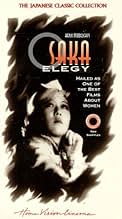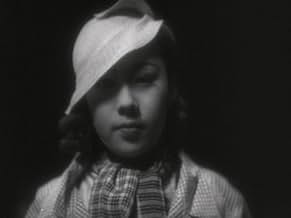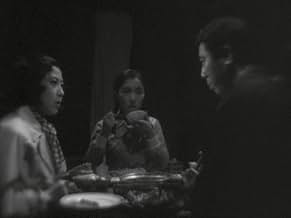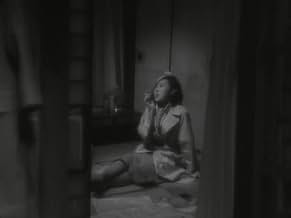AVALIAÇÃO DA IMDb
7,2/10
2,7 mil
SUA AVALIAÇÃO
Adicionar um enredo no seu idiomaA young woman becomes a mistress of her boss in order to support her family.A young woman becomes a mistress of her boss in order to support her family.A young woman becomes a mistress of her boss in order to support her family.
- Direção
- Roteiristas
- Artistas
Avaliações em destaque
"Osaka Elegy" (Japanese, 1936): Directed by Kenji Mizoguchi. This is one of his earliest films. Japan was in the throes of a cultural turmoil. They were busy invading China, and feeling the schizophrenia of traditional vs modern society. This story is about a decent young woman, who, when familial pressure is applied, does anything necessary to pay the bills of a pathetic father, a self-centered brother, and a confused, naïve sister, and, a keep an abusive boss "happy". As we might expect (now), her road darkens as everyone demands more and more, gives back less and less, and shuns her for doing what they suggested and made their advantage. Expect a noir-ish look to the film, with spare traditional home sets and costuming, contrasted with high style business/commercial sets and costuming.
This is the first collaboration between Mizoguchi and writer Yoshikata Yoda, with the actress Isuzu Yamada in the principal role, as a young telephonist pushed to prostitution to save her ruined family, and then repudiated by them. Mizoguchi begins his impressive mastership with the framing and the perspective and, though still far from his masterpieces, is an interesting milestone for the Mizoguchi admirers.
Ayako (Isuzu Yamada) becomes the mistress of her boss, Mr. Asai, so she can pay her father's debt, and prevent him from going to prison for embezzlement. She also sends money to her brother Hiroshi to pay his university tuition, but her father intercepts it.
Mizoguchi considered the film his first serious effort as a director, and while I am not familiar with his earlier work, I have to say this is the kind of film that leaves a mark. Either Mizoguchi or his cinematographer had an excellent awareness of the camera -- the door closing to block the camera early on in the film -- years ahead of its time.
The subject matter in general is impressive. I am not sure what the typical morality was in pre-war Japan, but to feature adultery and whatnot in the 1930s seems quite bold.
Mizoguchi considered the film his first serious effort as a director, and while I am not familiar with his earlier work, I have to say this is the kind of film that leaves a mark. Either Mizoguchi or his cinematographer had an excellent awareness of the camera -- the door closing to block the camera early on in the film -- years ahead of its time.
The subject matter in general is impressive. I am not sure what the typical morality was in pre-war Japan, but to feature adultery and whatnot in the 1930s seems quite bold.
...with a plot out of Precode Hollywood and frequent jazz music to match. A pretty young switchboard operator reluctantly decides to become the mistress of her boss so she can help her financially-strapped father who had embezzled company funds for an investment that went bad, and her college-student brother who needs his tuition paid. Of course she is ostracized from the family for her immorality without giving her the chance to explain how they got their money. Various other relationships and subplots also come into play. This one has nicely-plotted character dynamics, good performances, and beautiful cinematography.
10Gonzo-23
It was this film alone that drove me into an intense obsession with cinema. Mizoguchi is the great Japanese master, and Osaka Elegy reveals his genius. From his long take compositions that are taxed with complexity and tension, to his ambigious depictions of character, I felt like I had grown after I had seen this film. Notice the national allegory at the film's conclusion, a confused and lonely Japan. And his inconclusive final shot taken many years before the well known 400 Blows. The devastating melodrama is not undercut by any cinematic manipulation. I highly recommend this to any lover of the cinematic medium. Also, I am a sucker for self-reflexive Kabuki theater sequences...
Você sabia?
- Citações
Junzo Murai: You're a woman... Being taken to the police station... Getting thrown into jail... You've done shameful things. You ungrateful child!
Ayako Murai: How could you say that? I never expected that I'd be treated like this when I came home. This is ridiculous! I thought you would welcome me with open arms. If I'd have known this, I never would have come back.
- ConexõesFeatured in Century of Cinema: Nihon eiga no hyaku nen (1995)
Principais escolhas
Faça login para avaliar e ver a lista de recomendações personalizadas
- How long is Osaka Elegy?Fornecido pela Alexa
Detalhes
- Tempo de duração1 hora 11 minutos
- Cor
- Mixagem de som
- Proporção
- 1.37 : 1
Contribua para esta página
Sugerir uma alteração ou adicionar conteúdo ausente

Principal brecha
By what name was Elegia de Osaka (1936) officially released in India in English?
Responda






















